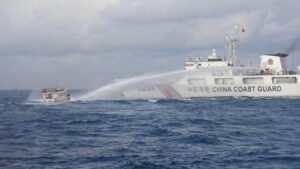By Adrian H. Halili, Reporter
THE Department of Foreign Affairs (DFA) on Tuesday rejected what it called misleading claims by certain countries about the extent of Philippine territory in the South China Sea, saying these distort historical and legal facts.
“Some countries have been articulating an erroneous opinion that intentionally misreads certain treaties upon which the extent of Philippine territory is partly based,” it said in a statement, without naming the countries involved.
The agency said it remains vigilant against any effort to spread misinformation about the Philippines’ territorial boundaries. “It will continue to assert and preserve its territorial integrity, and strongly uphold its sovereignty, sovereign rights and jurisdiction in accordance with international law,” the DFA said.
The agency said the Philippines has full sovereignty over its archipelago and other territories, including Bajo de Masinloc (Scarborough Shoal) and the high-tide features of the Kalayaan Island Group (Spratly Islands).
It said the country’s rights to these maritime features are “incontrovertible and firmly founded on international law, legal principles, effective control and recognition through international treaties and agreements.”
The DFA cited the 1898 Treaty of Paris and the 1900 Treaty of Washington as defining instruments that established the limits of Philippine sovereignty.
“These treaties clearly and firmly state the extent of Philippine territory as well as their meaning derived from the consistent demonstrations of sovereign authority and jurisdiction exercised by the Philippines over its territory through the centuries,” it said.
It added that the country’s 1935, 1973 and 1987 Constitutions further clarify the legal basis and extent of the national territory.
The statement comes amid rising tensions in the South China Sea, where Beijing continues to assert its sweeping “nine-dash line” claim covering over 80% of the disputed waterway. The Permanent Court of Arbitration in The Hague ruled in 2016 that China’s expansive claim had no legal basis under international law — a decision Manila has repeatedly invoked and which Beijing continues to ignore.
The waterway remains a major global trade route, with more than $3 trillion worth of goods passing through annually. Manila has recently increased maritime patrols and diplomatic protests in response to Chinese incursions in areas within its exclusive economic zone.
Meanwhile, the Philippines remains confident that the resignation of French Prime Minister Sébastien Lecornu would not disrupt talks for a visiting forces agreement between Manila and Paris that aims to deepen security cooperation.
“We are now in the final round of negotiations,” Defense Secretary Gilberto C. Teodoro, Jr. told a Senate budget hearing. “Hopefully, their country acts on it given the occurrences in France now. I am confident that their foreign policy will not change.”
Mr. Lecornu announced his resignation on Monday amid a political crisis in France.
France first proposed the military pact in 2023, followed by the signing of a letter of intent between Mr. Teodoro and Mr. Lecornu. The deal seeks to strengthen bilateral defense cooperation through joint training, strategic collaboration and defense industry development.
Mr. Teodoro said he had also received a letter of intent from the UK for a similar agreement. “In particular, land forces, because the UK’s land force is more like the Philippine Army than larger armed forces,” he said. “We will learn a lot from them.”
The Philippines and the UK last year agreed to craft a defense and security cooperation framework covering training, peacekeeping operations, humanitarian assistance, disaster relief, weapon development and research.
Manila has been expanding its defense partnerships as tensions rise in the South China Sea, where China continues to block Philippine vessels within the country’s exclusive economic zone.
The Philippines has strengthened military exercises with the US and Australia and is pursuing security arrangements with other allies.
“All of these countries that we have entered a status of visiting forces agreement with respect the arbitral award and recognize that China’s nine-dash line is baseless,” Mr. Teodoro said. “They respect the sovereign rights [of the Philippines] in its exclusive economic zone.”

